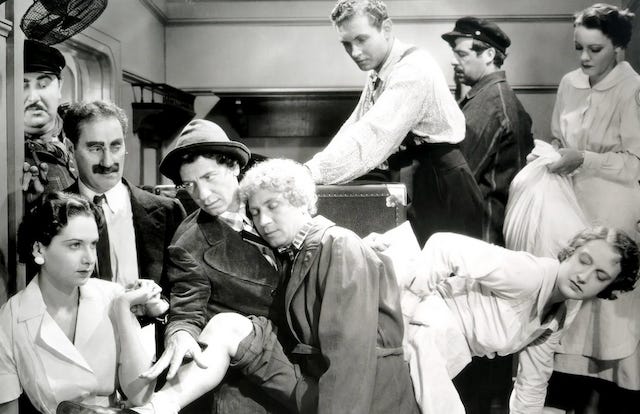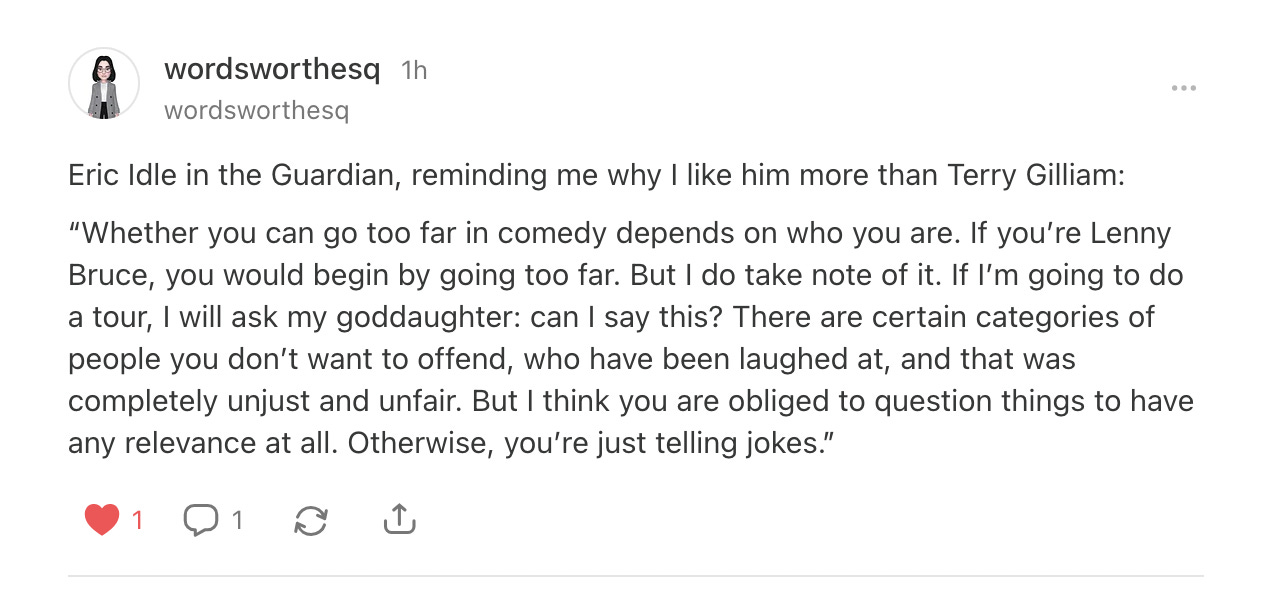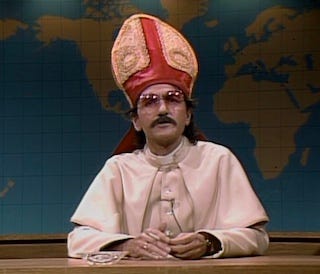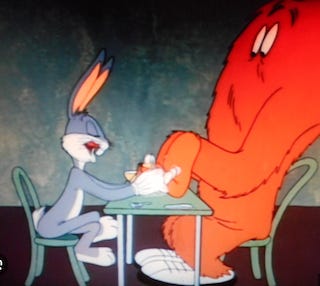Mocking Your Elders for Fun & Profit
Season 9, #3: Me and Julio Daytalking down by the ol' schoolyard
WE WERE SNARKY LITTLE motherfuckers growing up.
That’s the lede.
That’s the point of this newsletter.
And the only thing I’m burying is, well, all that follows.
Did the lede offend you? (I think it offended me, which is, I don’t know, a good sign, right? I offend myself somewhat regularly.) You see, when I get nostalgic about the past, it’s not the kind of things that “normal” people recount—you know, weddings, funerals, family vacations, graduations, first dates, last dates…
For me it’s recalling all those preteen years when I watched too much television, listened to too much bubblegum pop music on the radio, hung out with my similarly snarky friends, and generally rolled my eyeballs out of their sockets at nearly everything our elders said.
So me—WE—had to be beyond awful.
Which reminds me that was the inspiration to write this.
Because these days, everyone seems to be a supersonic snarkmeister. Of course, snark is easy pickings. Satire takes some real back muscle work. And wit (something I’ve been accused of more times than I can count), while flinty and fast, was first made popular by Oscar Wilde (“I refuse to have a battle of wits with an unarmed man.”) Or, in my personal history, Monty Python…
But more on that in a sec.
Now for something completely different.
Jumping the Great White Snark
So where do you park your snark? Or, better yet, how do you do that?
I think you have to sit with your cynicism, your snark, at least that’s what I’ve learned. Cynicism is quick loading, snark fires off fast, but good satire needs to be nursed, milked, maybe even coddled and aged like good cheese into existence.
Oh, and it needs an audience. And an army of like-minded satirists behind you.
Here on Substack I went looking for that army and they did not disappoint.
To wit:
That’s the esteemed Susie Bright when asked who were the subversive comedians that inspired her. I’d have to agree. My late parents used to watch the show and as a family we roared over the Ricardo family’s exploits. Hey who cares if Ricky Ricardo was from Cuba! His reactions to his wife Lucy alone were priceless.
Fast on the heels of preteen life, I was hot for MAD Magazine, the incoming stoner culture, and the early Bill Cosby records we neighborhood kids listened to with raucous glee.
MAD had just the right touch of in-your-face disgusting everything that particularly appealed to our age demographic. Every chance I got in the magazine rack at the local Keaveny’s Drugs, I’d plop down allowance money for an issue and devour it back at home while listening to WDGY on the AM/FM clock radio in my bedroom.
So, I posed this question to my comedy-adjacent Substack friends: “What was the first subversive comedy show or comedian for you?”
Chris Stanton didn’t skip a beat.
The Marx Brothers. My father is a big fan, so I saw most of their movies when I was very young. I had no idea about the social commentary aspect of their comedy until I was older. I just thought they were absolutely hilarious. Still do.
—Chris Stanton, Stantonland
Well, of course!
There was never anything more satisfying to my young mind than imagining the next Mrs. Gloria Teasdale I encountered would be the foil for my own version of the indomitable Rufus T. Firefly.
If I failed to execute, I’d just need more practice.
Of course with a little help from my friends.
Socially Unacceptable, aka Change Your Shirt!
Back when I was writing regularly to Completely in the Dark on WordPress, this subject arose while drafting a post I titled “The Basement Tapes.”
I’d discovered some cassette tapes from the early 1970s where my friends and I tried to duplicate some of the comedy radio shows we were listening to.
For the most part we parodied TV and radio ads that annoyed the beejeebers out of us. Sometimes we were able to sneak into the local drive-in theater when we caught wind that a subversive movie like Young Frankenstein or Blazing Saddles was playing.
My friend Sheila Moeschen seems to have run with a similar circle of cutups:
I was probably too young to think of it as “subversive” specifically, but I think my earliest exposure to a formula of “anger + righteousness + TRUTH delivered with humor” came from George Carlin’s stand-up of the early 1980s. He had a way of slicing through the bullshit while calling it out as such that was laser focused and keenly smart that was masterful. It was also impossible to miss that what he was really doing was speaking truth to power and hypocrisy; I just didn’t have the word “subversive” for it then as I was probably 7 or 8. I also remember watching Blazing Saddles at a young age (also around the same age), but not getting what was so radical and truly funny about it until I was probably 14 or 15.
—Sheila Moeschen, Humor Saves!
There’s an element of truth in Sheila’s equation and we felt anger that those “above us” were not being honest—THEY WERE LYING—and it was up to us, our generation, to set things right and deliver the truth with humor. Writer Martha Bayles echoes the sentiment: “Satire is the sharp edge of humor, often motivated by righteous anger at injustice, malfeasance, and persecution. But its effectiveness and power depend on the particular target being satirized, the motive for satirizing it, and the position and character of the satirist.”1
CK Steefel of the Substack Good Humor, and who previously appeared on Seinfeld, also responded to the question about first brushes with subversive humor:
Carlin was strictly forbidden on our family’s color television set. I had to go watch him on a neighbor friend’s portable black and white TV, under the cover of darkness (during the summer, sleeping outside in a blue tent next to their home’s outdoor power outlet, tuned into The Tonight Show with Johnny Carson, sipping Orange Crush, stuffing Doo-Dads into our faces, and laughing our asses off).
When I got home in the morning, sufficiently disobedient and overtired, I was told to just go change my shirt.
“You can’t go out looking like the Wreck of the Hesperus!”
YES I CAN!
Stop It. You’re Upsetting People
Snark is easy—it’s the Kraft boxed Mac ‘n’ Cheese of humor.
Satire takes consideration, but maybe not too much. It’s like making a béchamel and adding the right tinge of nutmeg and Gruyère cheese. I remember when my friends and I first discovered Monty Python’s Flying Circus, our jaws collectively dropped. Lookit those British dudes—you can’t do that!
Music writer friend Emm Campbell responded with their take:
“I think you are obliged to question things to have any relevance at all,” says everything to me. First watching Monty Python and, in 1975 all the way to the present day, Saturday Night Live. We Americans could do it too!
Michael Estrin swooped in with a sharp reminder of how good SNL could be.
The Buckwheat Is Dead sketch on SNL. I think I saw it when I was 8 or 9. I don’t think I understood the joke, but immediately understood that people were upset about the joke … and that appealed to me.
—Michael Estrin, Situation Normal
Saturday Night Live in the early days connected with us goofy disaffected snarkmeisters because they did a lot of spoofs on advertising (“Bass-O-Matic,” “Colon Blow,” etc.) but I was totally wrapped up in the subtle humor of Don Novello’s Father Guido Sarducci or Bill Murray’s cloyingly smarmy Nick the Lounge Singer.
Michael’s choice of Eddie Murphy as Buckwheat (and the deliciously sly and lovable Mister Robinson’s Neighborhood) really sunk some teeth into what satire could do. It goes back to the original sense of truth-telling and injustice but the beautiful thing about Eddie Murphy’s work on SNL is how goddamn smart it is—wrapped in history and the layers of mainstream media’s tone deafness that it deftly cuts through.
And the best thing is, I can’t stop laughing. Because if I’m not laughing, I’m crying—that is, until I’m able to laugh again.
Wash, rinse, and repeat.
Meh … What’s Up, Doc?
So where do I park my snark?
These are my two mavericks of subversive comedy: Bugs Bunny … and the Road Runner’s insanely satisfying dominance over Wile E. Coyote.
Bugs Bunny taught me everything about how to be agile and to bend with the winds (or Elmer Fudd) barreling down on you, and oddly enough, stay happy and somewhat mentally healthy. He always lived to fight another day. Bugs Bunny is without a doubt my hero of resilience and courage and humor.
Ever the wordless enigma, The Road Runner meep-meeped his way through every trap Wile E. Coyote laid for him.
What did I learn from that?
Quit while you’re ahead.
Notes and extra texture
Wilde, Shaw, and Whistler in a wit round (Monty Python’s Flying Circus):
Breaking News: Some Bullshit Happening Somewhere (The Onion):
Buckwheat Dead and America Mourns (Saturday Night Live, aired March 12, 2011):
Ordering room service with the Marx Brothers’ A Night at the Opera (1935):
Saturday Night Live and Nick the Lounge Singer Sings the Star Wars Theme (1977):
“The Humor Is Almost Lost on Us: Resisting the Decline Into Snark” by Martha Bayles, retrieved from The Hedgehog Review 26.3 (Fall 2024) with request outstanding to reference here.














I don’t know if the Stooges count but if they did they’d be my first. Then Kinison, then Carlin.
My dad took me and my two best friends to a Marx Bros movie marathon when we were about 10 years old. A seminal moment in our lives. During the next two years we watched a Marx Bros movie every time it was on tv (which I think was quite often). Thirty years later I got to experience this with my own sons.
Elders, kids...we all loved them!